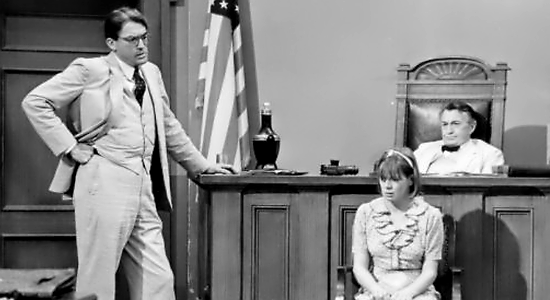Atticus Finch: American literature’s most celebrated rape apologist and Holocaust denier
Atticus Finch: American literature’s most celebrated rape apologist, says Ashe Schow:
“If ‘To Kill A Mockingbird’ were taught in women’s studies classes today, Finch would have to be labeled the villain of the book for not accepting at face value an accuser’s tale of rape and for posing difficult, painful questions to her on the witness stand.”
Maywella Ewell imagined a modern take on the story:
And that’s why I told the court that Tom Robinson raped me. It wasn’t the upsetting but educational choice of a girl who was new to sex. It didn’t feel like a choice at all. I wasn’t sure whether I couldn’t stop or if I didn’t want to.
But Tom Robinson said he didn’t rape me, and Mr. Finch seemed to believe him. He said that I had invited him into the house many times to do odd jobs, that he hadn’t taken pay because he felt bad for me. He looked down at me. He said that the night he raped me, I invited him in and specifically sent away my siblings so that I could have my way with him. He said I grabbed him around the legs, hugged him around the waist, kissed him on the side of his face. He testified that I said that I’d never kissed a grown man before, and what my papa did to me didn’t count. He told the court that I’d said, “Kiss me back, n—–.”
Then he said my papa came to the window and yelled, “You goddamn whore, I’ll kill ya.”
If fine fancy gentlemen don’t want to do anything about my rape, they’re all yellow, stinking cowards. I have had my character and credibility questioned at every turn. I have been attacked online with violent and misogynistic language. My words have been torn apart in an attempt to prove I am a liar, or worse, a deviant myself. But I don’t believe I am to blame. I don’t believe any of us who have been raped and/or assaulted are to blame. Survivors have the right to tell their stories, to take back control after the ultimate loss of control. There is no right way to survive rape and there is no right way to be a victim.
So, Mr. Finch, I need your support, not your pity. What survivors need more than anything is to be supported, whether they choose to pursue a criminal investigation or to rebuild their world on their own terms. You can help by never defining a survivor by what has been taken from her. You can help by saying I believe you.
A story with a rape allegation carries an immediate electric charge. In Jim Crow’s South, lynchings often came with a story of the victim having raped a white girl. With the energy of such a story, it wasn’t too hard to whip up a fury strong enough to leave a man hanging from a tree. The “rape propaganda” was necessary to garner the emotions necessary to press the real, dark, agenda. Al Sharpton took a page out of the old South’s playbook and brought us Tawana Brawley, who accused six white men of raping her. The story of white on black crime resonated, and it helped to promote a social justice agenda, but Tawana Brawley was no more a rape victim than two white women in Scottsboro, Alabama, who falsely accused nine black teenagers more than 80 years ago.
What do these stories have in common? Someone had an agenda, and they knew that a rape story would put it on a rocket powered toboggan.
The College Fix says this:
The College Fix recently reported on emerging questions regarding the alleged gang rape at the University of Virginia. Even the Washington Post is now questioning the accuracy of Rolling Stone reporter Sabrina Rubin Erdely’s UVA story.
Does the Post also believe the Holocaust never happened?
When views are so entrenched, who needs facts..?
Posted: 17th, December 2014 | In: Reviews 0 Comments | TrackBack | Permalink



